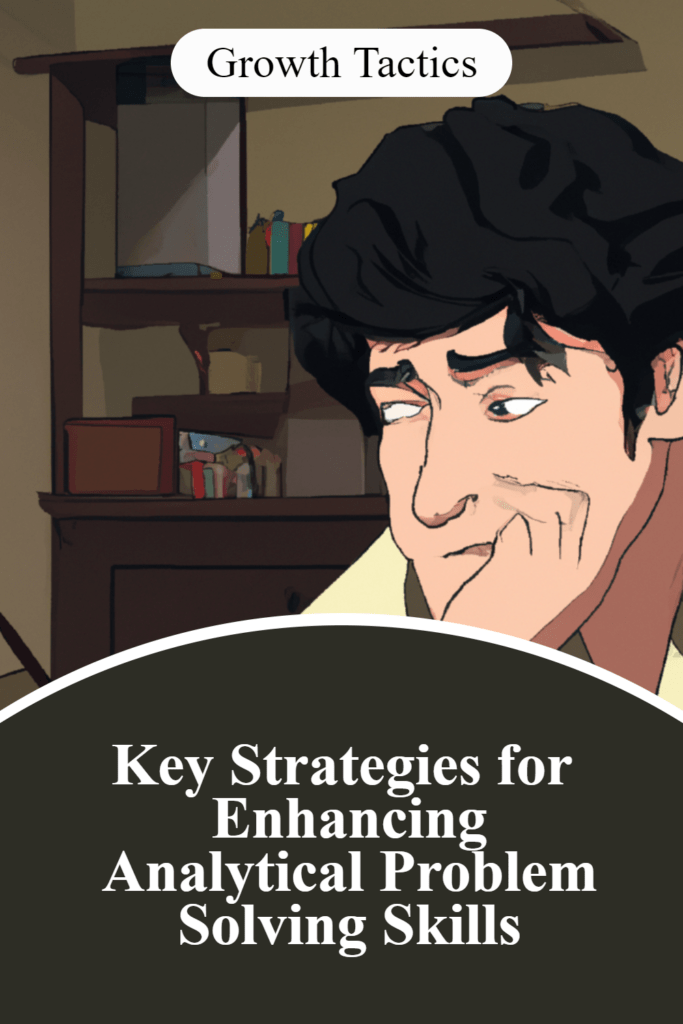In my ten years of management, I’ve encountered a wide array of challenges, each presenting a unique set of problems to solve. Tapping into analytical problem solving skills has not only been advantageous but crucial in navigating these hurdles effectively.
Adopting a methodical approach has enabled me to dissect issues, analyze data, and forge solutions that are not just quick fixes but sustainable improvements. This skill set is a powerful tool that has consistently added value to the organizations I’ve worked with, affirming that the ability to analyze, think critically, and solve complex problems is pivotal in today’s dynamic professional landscape.
Jump To Section
Understanding Analytical Problem Solving Skills
Analytical problem-solving skills form the foundation of successful decision-making and troubleshooting in any professional setting. An analytical skill is essentially the ability to dissect problems, identify patterns, and derive logical solutions based on the information provided. These capabilities are closely linked with analytical thinking, critical thinking, and problem-solving skills, each playing a vital role in the process of addressing complex issues.
Analytical Thinking: This involves the systematic breakdown of complex situations or data sets. By engaging in analytical thinking, one becomes adept at organizing and interpreting data, recognizing underlying themes, and using these insights to forecast potential outcomes.
Critical Thinking: Critical thinkers question assumptions rather than accepting them at face value. They evaluate arguments, detect inconsistencies in the rationale, and are not easily swayed by emotional appeals. This skill is crucial because it supports the overall analysis by ensuring the conclusions reached are well-founded and unbiased.
Problem Solving: At its core, problem solving is about identifying and resolving issues that impede progress. Effective problem-solving skills demand both creativity and analytical thought to navigate obstacles and develop efficient strategies. This involves a careful analysis of the problem, generating feasible solutions, and implementing them effectively.
The Interconnection of Skills
The relationship between analytical skills, critical thinking, and problem-solving is dynamic. For instance, effective problem solvers are often skilled analysts. They leverage data and information to understand problems comprehensively and apply their critical thinking to evaluate the solutions they devise. Similarly, being a strong analyst often requires robust critical thinking capabilities to evaluate and synthesize data accurately.
Understanding these skills and how they interplay to solve complex problems not only enhances your professional toolkit but also elevates your capacity to contribute meaningfully in various scenarios. By mastering these abilities, professionals can ensure their readiness to tackle a wide range of challenges, making them invaluable assets in any workforce.
Why Improve Your Analytical Skills?
Improving your analytical skills has both immediate and long-term benefits in today’s data-driven world. Strong analytical capabilities enable professionals to make sense of vast amounts of data, spot trends, and solve problems effectively. Here are some compelling reasons why enhancing your analytical skills is worthwhile:
1. Enhanced Decision-Making: With refined analytical skills, professionals can make decisions that are informed, data-backed, and more likely to lead to success. This heightened decision-making ability is critical in managerial roles where the stakes are high and the impact of decisions is significant.
2. Increased Efficiency: A keen analytical eye can identify inefficiencies and areas for improvement within an organization’s operations. Through data analysis and critical evaluation, processes can be optimized, saving time and resources.
3. Better Problem Anticipation: Analytical thinkers are often ahead of the curve when it comes to anticipating potential challenges. They can recognize patterns and predict issues before they arise, allowing organizations to be proactive instead of reactive.
4. Career Growth: Professionals who demonstrate strong analytical and problem-solving skills are often considered for leadership roles. Their ability to analyse complex problems, think critically, and devise effective solutions makes them prime candidates for advancement.
5. Adaptability to Change: The modern business environment is continuously evolving. Individuals with robust analytical skills are better equipped to adapt to changes because they can quickly comprehend new data and information and adjust their strategies accordingly.
6. Value in Diverse Fields: Analytical skills are not industry-specific—they are valuable across various fields. From science and technology to business and the arts, the ability to solve complex problems with a skill like analytical thinking is universally sought after.

Strategies to Enhance Your Analytical Thinking and Problem-Solving Skills
Improving your analytical thinking and problem-solving skills is a dynamic process that involves a range of strategies. By incorporating these strategies into your daily routine, you can develop a sharper, more analytical mindset and become more adept at navigating complex problems.
Engage in Continuous Learning
Continuous learning is the cornerstone of analytical thinking. The more you know, the better equipped you are to think critically about various topics.
- Read Widely: Expand your reading list beyond your core interests. Diverse knowledge can inspire new ways of thinking and problem-solving.
- Take Courses: Online platforms offer courses on everything from data analysis to critical thinking. These can provide structured ways to enhance your skills.
Practice Mindfulness and Reflection
Mindfulness and reflection can hone your ability to focus and dissect problems effectively.
- Reflect Regularly: Spend time reflecting on your day, the decisions you made, and how you could improve your problem-solving approach.
- Mindfulness Exercises: Practices like meditation can enhance your focus, aiding in clearer and more analytical thought processes.
Solve Puzzles and Play Strategic Games
Puzzles and games are not just fun—they’re exercises for your brain. Engaging in these activities can sharpen both your analytical thinking and problem-solving skills.
- Puzzles: Crossword puzzles, Sudoku, and logic problems can enhance pattern recognition and strategic thinking.
- Strategic Games: Chess, strategy-based video games, and board games can improve your ability to anticipate and plan for future scenarios.
Adopt a Questioning Mindset
To develop your analytical skills, challenge yourself to ask more questions and become comfortable with not immediately knowing the answers.
- Ask “Why” and “How”: When faced with a statement or conclusion, drill deeper by asking why it’s valid and how it was determined.
- Seek Multiple Perspectives: Before forming your own viewpoint, explore different angles and viewpoints on an issue.
Learn from Mistakes
Analytical thinking is often a process of trial and error. Reflect on mistakes as learning opportunities.
- Constructive Analysis of Failures: Instead of dismissing failures, analyze them to understand what went wrong and why.
- Feedback Loops: Encourage feedback from peers and mentors to gain insights into your problem-solving approach and how it can be improved.
Utilize Technology and Tools
Technological tools can support and enhance your analytical capabilities.
- Data Analysis Tools: Familiarize yourself with software that can help you manipulate and analyze data (e.g., Excel, Tableau, etc.).
- Project Management Software: These tools can help you break down big projects into manageable parts, fostering a more analytical approach to completing tasks.
Collaborate and Share Knowledge
Collaboration exposes you to different ways of thinking and problem-solving.
- Engage in Brainstorming Sessions: Collaborative brainstorming can unveil unique solutions to problems.
- Seek Mentorship: Mentors can offer insights and advice based on their own experiences and analytical journeys.
By integrating these strategies into your professional and personal development plans, you can gradually enhance your analytical thinking and problem-solving skills. Remember, the goal is not to become perfect but to continually improve and adapt.
Practical Applications of Analytical Skills in the Workplace
Analytical skills are not just abstract qualities valued in the theoretical realm; they have tangible, practical applications in various aspects of the workplace. Whether you’re navigating everyday tasks or steering strategic decisions, these skills can dramatically impact your effectiveness and the value you bring to your organization. Below are key areas where analytical skills play a vital role.
Data Analysis and Interpretation
In an era where data is considered the new oil, the ability to analyze and interpret data is indispensable. Professionals with strong analytical skills can sift through data sets to identify trends, patterns, and anomalies.
- Making Informed Decisions: By accurately interpreting data, you can make decisions that are backed by evidence rather than intuition.
- Predictive Analysis: Analyzing historical data allows for predicting future trends, helping organizations to prepare and strategize effectively.
Problem-Solving
Every business faces challenges, and the ability to problem-solve effectively sets apart successful organizations.
- Root Cause Analysis: Analytical thinkers can drill down to the root cause of a problem instead of just addressing symptoms, and ensuring long-term solutions.
- Optimization: Identifying inefficiencies and conceptualizing solutions can streamline processes, saving time, resources, and money.
Strategic Planning
Strategic planning requires a high degree of analytical thought, as it involves forecasting, risk assessment, and scenario planning.
- Long-term Vision: Through careful analysis, professionals can devise strategies that align with the company’s long-term goals.
- Risk Management: Analyzing potential risks and preparing mitigation strategies can protect the organization from future crises.
Communication and Reporting
The ability to communicate complex information in an understandable and actionable manner is a critical application of analytical skills.
- Data Visualization: Translating data into visual formats such as charts and graphs can help stakeholders understand insights at a glance.
- Effective Reporting: Crafting reports that highlight key findings and recommendations based on data analysis supports informed decision-making.
Project Management
Managing projects efficiently is a complex task that requires a blend of analytical and organizational skills.
- Task Prioritization: Analyzing the importance and urgency of tasks can aid in effective prioritization, ensuring critical projects are completed first.
- Resource Allocation: Assessing the resources (time, people, money) needed for various projects and allocating them in the most efficient manner is essential for project success.
Innovation and Product Development
Analytical skills are at the heart of innovation and designing products that meet market needs.
- Market Analysis: Understanding market trends and customer needs through analysis can direct the innovation process towards viable product ideas.
- Feasibility Studies: Before committing resources, analytical skills help in evaluating the feasibility of new products or modifications, considering factors like cost, target audience, and market demand.
By developing and applying analytical skills in these areas, professionals can significantly contribute to the success and growth of their organizations. The versatility of analytical skills underscores their importance across job functions and industries, making them key competencies in the professional world.
Concluding Thoughts
The journey to enhancing and applying your analytical skills in the workplace is an ongoing process that can lead to substantial personal and professional growth. By understanding the practical applications and benefits of these skills as outlined in the previous sections, you are now equipped to take deliberate steps toward integrating them into your daily work life.
Start small by identifying opportunities in your current role where a more analytical approach can be applied. Whether it’s through data-driven decision-making, a methodical approach to problem-solving, or strategic planning for future projects, each step you take will build your confidence and competence in using these skills.
Remember, the goal is not to overhaul your working style overnight but to incrementally incorporate analytical thinking and problem-solving strategies into your routine. Seek feedback from peers and mentors, reflect on your successes and areas for improvement, and remain open to continuous learning and development.
By committing to this path, you’ll not only enhance your value within your organization but also set the stage for a fulfilling, dynamic career fueled by insightful analysis and strategic thinking. Embrace the challenge, and let the journey towards becoming a more analytical thinker in the workplace begin today.


